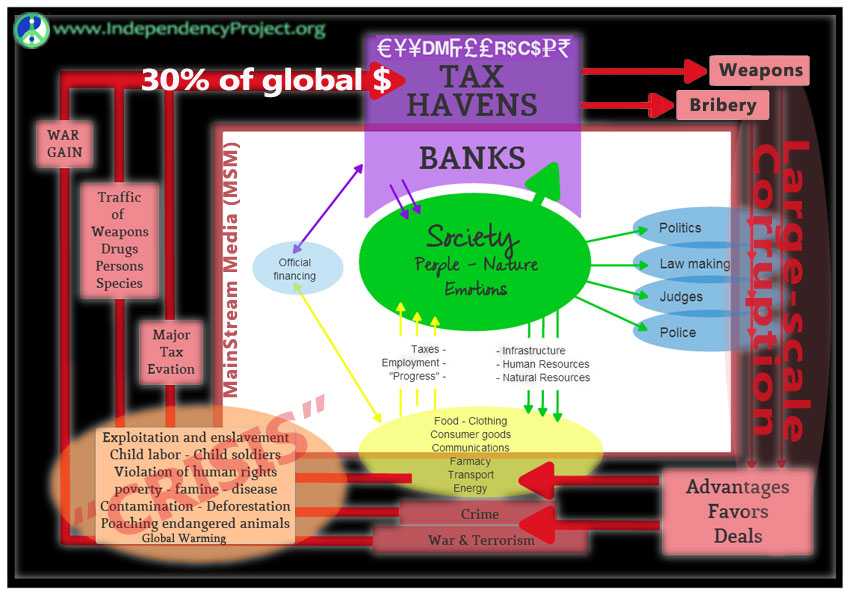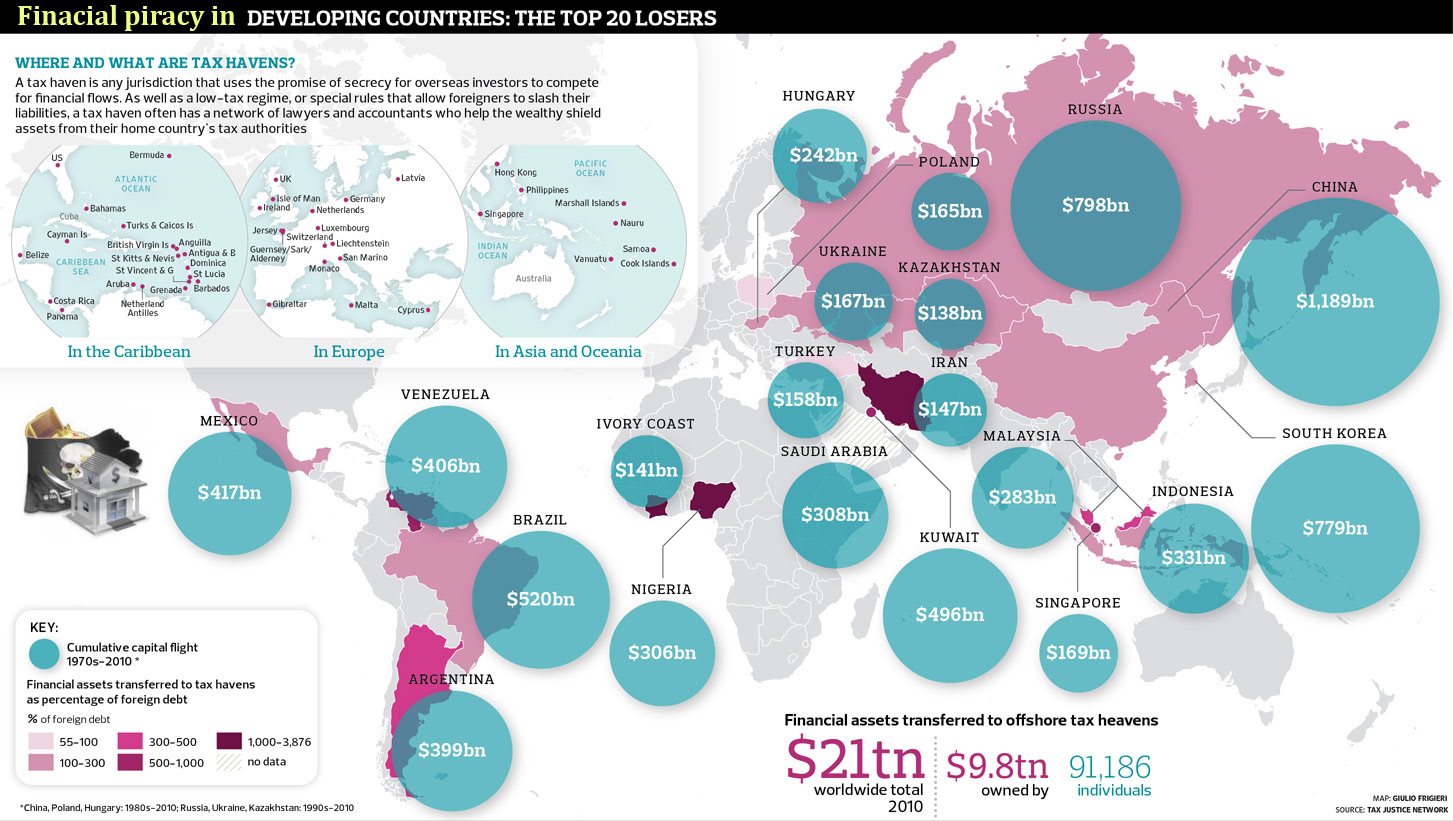Grootschalige Corruptie: oorzaak van alle ellende in de wereld
Grootschalige Corruptie (institutioneel, corporatief, crimineel) is de oorzaak van alle fundamentele problemen en ellende in de wereld: oorlog en terrorisme, georganiseerde misdaad en geweld, wapen-, drugs- en mensenhandel, schending van de mensenrechten, onrecht in het algemeen, uitbuiting van menselijke en natuurlijke middelen, hongersnood, milieuvervuiling, ontbossing, global warming en afbraak van de natuur in het algemeen.
Het overgrote deel van deze Corruptie wordt gevoed door zwart geld uit Belastingparadijzen. Om de grootschalige Corruptie te bestrijden is het dan ook essentieel dit ondoorzichtige, secundaire economische systeem in zijn geheel af te breken, zodat de Financiële Piraten in elk geval niet meer beschikken over die Schateilanden om hun Buit te verstoppen.
Het belangrijkste aandachtsgebied van het Independency Project is daarom ook in eerste instantie het (uit)vinden, verzamelen en delen van alle mogelijke manieren die, direct of indirect, leiden tot de volledige uitroeiing van Bankgeheim en Belastingparadijzen, waarmee een werkelijk democratische samenleving een kans krijgt.

De Wereldbank over corruptie:
The Bank has identified corruption as among the greatest obstacles to economic and social development. It undermines development by distorting the rule of law and weakening the institutional foundation on which economic growth depends.
Hundreds of governance and anti-corruption activities take place throughout the World Bank. These activities focus on monitoring staff conduct at the Bank, minimizing corruption in World Bank-funded projects, and helping countries improve their public sector and control corruption.
As outlined in the World Bank's Strategy on Governance and Anti-Corruption, the Bank will continue to expand efforts in these areas on three fronts: At the country level, the Bank is helping countries build capable, transparent, and accountable institutions and design and implement anti-corruption programs.
In Bank-funded projects, the Bank is minimizing corruption by assessing corruption risk in projects upstream, actively investigating allegations of fraud and corruption, and strengthening project oversight and supervision.
At the global level, the Bank is expanding partnerships with multilateral and bilateral development institutions, civil society, the private sector, and other actors in joint initiatives to address corruption.
....
Corruption is a cancer and no country, rich or poor, is immune nor is a multilateral development institution. Fraud and corruption have undoubtedly occurred in Bank-funded projects, but it would be nearly impossible to determine how much Bank money might have been lost. Corruption on a world-wide, country-by-country basis has not been measured by anyone, given the difficulties and enormous costs of collecting quantitative data on the subject.
Corruption sabotages policies and programs that aim to reduce poverty, so attacking fraud and corruption vigorously is critical to the achievement of our overarching mission to reduce poverty.
Siemens corruption (part of the Black Money documentary)
All companies get around laws and bribe in some fashion or the other. Often these involve extraordinary amounts of money. If you don't believe it, watch this segment from a PBS documentary about how Siemens conveniently did this by dealing in "slush funds" to capture business and stay competitive. Later, Siemens AG was found guilty for violating the Foreign Corrupt Practices Act by the U.S Justice Department and was slapped with a whopping 800 million dollar fine.
Black Money (full documentary - Frontline)
As the global financial downturn continues and pressure for profits increases on corporations across the world, a small group of lawyers in the U.S. Justice Department is pursuing an aggressive crackdown against an international business tactic -- bribery -- which the World Bank says amounts to as much as a trillion dollars a year in payments... more >>>
War against corruption (video)
Op deze website wordt corruptie in de wijdste zin van haar betekenis beschouwd (zoals de engelse wikipediabewoording zegt: "In philosophical, theological, or moral discussions, corruption is spiritual or moral impurity or deviation from an ideal.").
Als zodanig is elk gebruik van Schateilanden (Belastingparadijzen, Offshore 'bankieren', Bankgeheim) per definitie corrupt, evenals alle personen en entiteiten die betrokken zijn of er vanaf weten en het niet aangeven. Hervé Falciani dus niet, hij is juist een voorbeeld.
Eigenlijk is corruptie niks anders dan domweg vals spelen, de regels overtreden... van mensen of groepjes die niet tegen hun verlies kunnen of altijd willen winnen. In feite heel infantiel, met tegelijkertijd een zeker gebrek aan eergevoel. In feite dus gewoon enorm slap en dom, maar het leidt wel tot fraude en oplichting op hoog niveau en duistere speculatie. Dit leidt tot een overdreven, onnodige en surrealistische verrijking voor één persoon of klein groepje, tegenover een schandelijk verlies voor een ander persoon, een (aanzienlijk grotere) groep of natuur en milieu. Voor het gemak wordt op deze website simpelweg de klinkende term "corruptie" gebruikt, zo nu en dan afgewisseld door "(financiële) Piraterij" in directe analogie met de "Schateilanden" (voor belastingparadijzen) in een zeer kloppende beeldspraak.
Related links
- Nederland houdt corruptie in stand - nieuwsuur
- Corruptie: Handel in macht en invloedl
- Corruptie in Spanje: de zaak Gürtel




